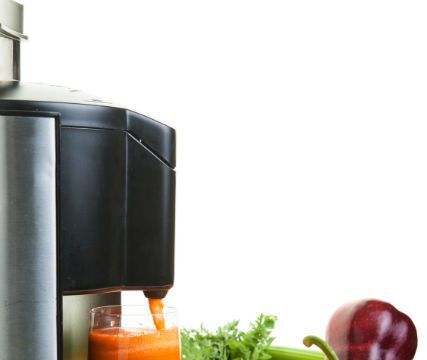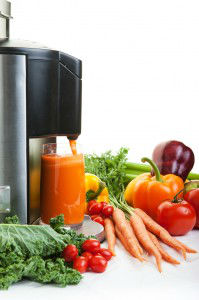
Juicing is a fabulous way to conveniently get the nutrition you need and to experiment with all types of fruits and vegetables, many of which you may never have considered eating on their own. While almost all produce can be juiced, there are some that are better consumed whole, in smoothie form, or not at all.
Some just don’t have the water content needed to juice, while the consistency of others makes them difficult to work with, and there there are even a couple of things that could potentially be harmful.
Carrot greens. There is some controversy as to whether or not carrot greens are actually toxic, however, most experts say no. In any case, they contain compounds that some people are allergic to in addition to not tasting all that great, so you probably don’t want to throw them in your juicer.
Citrus rinds. Citrus rinds on fruits like oranges and grapefruits shouldn’t be juiced as they contain indigestible oils that can be hard on the stomach. Lemons and limes are an exception – you can juice them whole if you’d like.
Wild parsnips. Don’t toss wild parsnips into your juicer as they’re considered poisonous. Cultivated parsnips on the other hand are fine to use in any juice.
Avocados. Avocados are great in smoothies but they can’t really be used in a juice as they have no juice. Remove the skin and pit and toss one into your blender the next time you make a smoothie as they’re a rich, creamy powerhouse of nutrition. They contain vitamins, minerals, protein, carbohydrates, water and EFA’s – essential fatty acids.
Apple seeds. While you may be tempted to throw a whole apple into your juicer, it’s generally not a good idea as they contain a small amount of arsenic. If a seed is accidentally swallowed without chewing, it won’t cause any harm as the hard coating protects the inner core of the seed, and the amount of arsenic is said to be so small it would really take a lot of apples to damage an adult, however, it could cause problems in your children. Either way, it’s probably better not to use them in your juice.
Just about everything else can be juiced, and there are quite a few foods that you may not have considered putting in your juicer. Why not do some experimenting and try these?
Dandelion Greens
The common dandelion that wreaks havoc on your lawn is edible and offers a wealth of nutritional and medicinal benefits. Dandelion greens provide four times as much calcium, one-and-a-half times vitamin A and seven-and-a-half times as much vitamin K as broccoli. Their diuretic properties also make them helpful for reducing symptoms of some liver, gallbladder and kidney conditions and even clearing up acne. Make sure not to use dandelions that have had chemicals applied (like toxic lawn fertilizers).
Cranberries
 Cranberries help to prevent bacteria from forming in the bladder, prostate and kidneys, and they can even help prevent kidney stones and they’re well-known for fighting a bladder infection. Cranberries may also help protect against stomach ulcers by preventing the adhesion of the bacteria H. pylori on the stomach wall. Their potent phytonutrients also work to inhibit the growth of oral, colon, and prostate cancer cells, in addition to battling breast cancer cells.
Cranberries help to prevent bacteria from forming in the bladder, prostate and kidneys, and they can even help prevent kidney stones and they’re well-known for fighting a bladder infection. Cranberries may also help protect against stomach ulcers by preventing the adhesion of the bacteria H. pylori on the stomach wall. Their potent phytonutrients also work to inhibit the growth of oral, colon, and prostate cancer cells, in addition to battling breast cancer cells.
Cabbage
Cabbage offers potent anti-inflammatory properties as well as powerful antioxidants. Cabbage has been shown to help heal stomach ulcers as well as being a cancer fighter and full of indoles that aid in estrogen balance and regulating metabolism. As it doesn’t have a great taste on it’s own, the flavor can easily be masked by other tastier produce.
There are so many great fruits and veggies that can be juiced, juicing may almost be considered an art! Have fun, get creative and flood your body with the important nutrition it needs.
-The Alternative Daily
Sources:
http://www.juicemaster.com/us/juice-therapy/a-to-z/avocado
http://www.healthjuices.net/knowledge-base/juicing-frequently-asked-questions
http://www.all-about-juicing.com/what-not-to-juice.html
http://healthyeating.sfgate.com/health-benefits-eating-dandelion-greens-4433.html
http://www.healthyeating.org/Healthy-Eating/All-Star-Foods/Fruits/Article-Viewer/Article/205/health-benefits-of-cranberries.aspx
http://articles.mercola.com/sites/articles/archive/2013/08/03/cabbage.aspx

